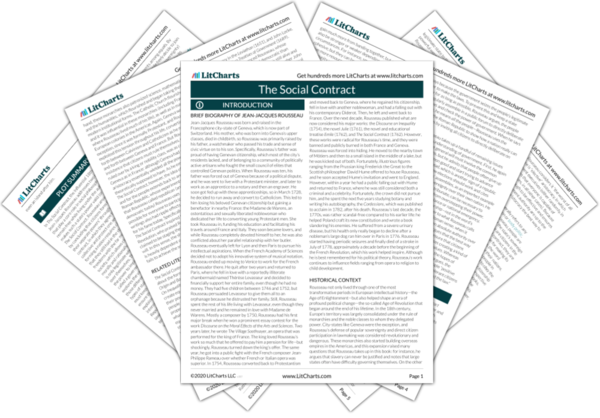Sovereignty Quotes in The Social Contract
The act of association consists of a reciprocal commitment between society and the individual, so that each person, in making a contract, as it were, with himself, finds himself doubly committed, first, as a member of the sovereign body in relation to individuals, and secondly as a member of the state in relation to the sovereign. Here there can be no invoking the principle of civil law which says that no man is bound by a contract with himself, for there is a great difference between having an obligation to oneself and having an obligation to something of which one is a member.
Suppose we draw up a balance sheet, so that the losses and gains may be readily compared. What man loses by the social contract is his natural liberty and the absolute right to anything that tempts him and that he can take; what he gains by the social contract is civil liberty and the legal right of property in what he possesses. If we are to avoid mistakes in weighing the one side against the other, we must clearly distinguish between natural liberty, which has no limit but the physical power of the individual concerned, and civil liberty, which is limited by the general will; and we must distinguish also between possession, which is based only on force or “the right of the first occupant,” and property, which must rest on a legal title.
We might also add that man acquires with civil society, moral freedom, which alone makes man the master of himself; for to be governed by appetite alone is slavery, while obedience to a law one prescribes to oneself is freedom. However, I have already said more than enough on this subject, and the philosophical meaning of the word “freedom” is no part of my subject here.
The better the state is constituted, the more does public business take precedence over private in the minds of the citizens. There is indeed much less private business, because the sum of the public happiness furnishes a larger proportion of each individual’s happiness, so there remains less for him to seek on his own. In a well-regulated nation, every man hastens to the assemblies; under a bad government, no one wants to take a step to go to them, because no one feels the least interest in what is done there, since it is predictable that the general will will not be dominant, and, in short, because domestic concerns absorb all the individual’s attention. Good laws lead men to make better ones; bad laws lead to worse. As soon as someone says of the business of the state—“What does it matter to me?”—then the state must be reckoned lost.
At the opening of these assemblies, of which the only purpose is the maintenance of the social treaty, two motions should be put, motions which may never be annulled and which must be voted separately:
The first: “Does it please the sovereign to maintain the present form of government?”
The second: “Does it please the people to leave the administration to those at present charged with it?”












